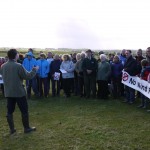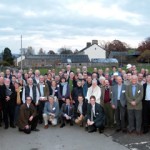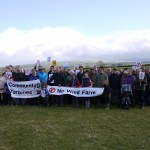only connect: creating opportunities for our rural communities
Two weeks ago, on a mizzening Saturday morning in Mungrisdale – having just cut the ribbon of the Northern Fells Group’s new fell-runner community bus – I visited the house of an elderly woman living on a state pension, whose cottage lay at the end of an unpaved track. The charity’s founder, Dr Jim Cox, was keen to show me and the Government Minister who was with us that the spectacular natural beauty of our uplands conceals pockets of real poverty. This was one of the central issues addressed last Thursday with the launch of the Prince of Wales’ Countryside Fund. Its activities coincide very closely with our priorities in Penrith and the Border, from ‘buying local’ to supporting affordable housing and family farms. The fund has already undertaken to offer targeted help to local organisations such as the Penrith-based Farmer Network with a grant to fund eight hill-farm apprenticeships in association with Newton Rigg. As the Prince said recently: “The church, the village school, our shops and pubs all depend on a local economy, the backbone of which is agriculture and the family farm. Without them, we are left with ghost communities. Is that the countryside we want?” Our rural areas remain under threat. The National Index of Deprivation reports that an estimated 23% of households in Penrith and the Border live in fuel poverty – more than double the English average. The average house price in our constituency is £180,000, and yet the average annual salary in the Eden valley is roughly £16,000. Recent NFU research found the average farmer’s income in upland areas to be just £6,000. Access to public services and financial advice is difficult at best, compounded by extremely poor transport links (this is why it is so important that in the Caldbeck area, fell-runner buses can connect communities in enterprising and efficient ways).
And yet, we are rich in so many other ways. We can boast of activists lobbying tirelessly for improved resources in cottage hospitals, the better to embrace state-of-the-art diagnostic and treatment technologies; of community groups committed to digging trenches with their own tractors to lay fibre-optic broadband cables for the benefit of their neighbours; of volunteers giving up hours of their time to help those less able with domestic chores and home repairs. That same drizzly Saturday morning, at the Mosedale Coffee Shop – a community-run summer initiative housed in the Quaker Friends’ Meeting House – I drank hot coffee and ate flapjacks baked by one of the many volunteers of the Northern Fells Group, itself a project inaugurated by the Prince in 1999 as one of his Rural Revival Projects. And this in a week when the Eden District was announced as one of four test-beds for the ‘Big Society’ agenda. Our challenge – and my challenge – is to connect all the energy and interest and needs of rural communities with our new government. This won’t be easy. We have just heard that the Commission for Rural Communities and the Rural Advocate have been abolished. Many other agencies connected with rural affairs are also disappearing. There will be less money. We must, therefore, respond by taking initiative. We must force government to be more respectful of the values and projects of local communities, and more tolerant of risk. And above all we must make rural places which can often seem marginal to London, central to our national concerns.









